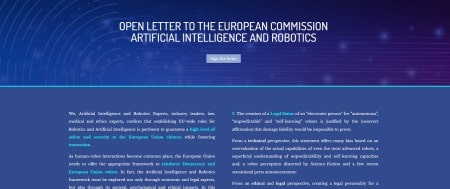We, Artificial Intelligence and Robotics Experts, industry leaders, law, medical and ethics experts, confirm that establishing EU-wide rules for Robotics and Artificial Intelligence is pertinent to guarantee a high level of safety and security to the European Union citizens while fostering innovation.
As human-robot interactions become common place, the European Union needs to offer the appropriate framework to reinforce Democracy and European Union values. In fact, the Artificial Intelligence and Robotics framework must be explored not only through economic and legal aspects, but also through its societal, psychological and ethical impacts. In this context, we are concerned by the European Parliament Resolution on Civil Law Rules of Robotics, and its recommendation to the European Commission in its paragraph 59 f):
“Creating a specific legal status for robots in the long run, so that at least the most sophisticated autonomous robots could be established as having the status of electronic persons responsible for making good any damage they may cause, and possibly applying electronic personality to cases where robots make autonomous decisions or otherwise interact with third parties independently;”
We believe that:
1. The economical, legal, societal and ethical impact of AI and Robotics must be considered without haste or bias. The benefit to all humanity should preside over the framework for EU civil law rules in Robotics and Artificial Intelligence.
2. The creation of a Legal Status of an “electronic person” for “autonomous”, “unpredictable” and “self-learning” robots is justified by the incorrect affirmation that damage liability would be impossible to prove.
From a technical perspective, this statement offers many bias based on an overvaluation of the actual capabilities of even the most advanced robots, a superficial understanding of unpredictability and self-learning capacities and, a robot perception distorted by Science-Fiction and a few recent sensational press announcements.
From an ethical and legal perspective, creating a legal personality for a robot is inappropriate whatever the legal status model:
a. A legal status for a robot can’t derive from the Natural Person model, since the robot would then hold human rights, such as the right to dignity, the right to its integrity, the right to remuneration or the right to citizenship, thus directly confronting the Human rights. This would be in contradiction with the Charter of Fundamental Rights of the European Union and the Convention for the Protection of Human Rights and Fundamental Freedoms.
b. The legal status for a robot can’t derive from the Legal Entity model, since it implies the existence of human persons behind the legal person to represent and direct it. And this is not the case for a robot.
c. The legal status for a robot can’t derive from the Anglo-Saxon Trust model also called Fiducie or Treuhand in Germany. Indeed, this regime is extremely complex, requires very specialized competences and would not solve the liability issue. More importantly , it would still imply the existence of a human being as a last resort – the trustee or fiduciary – responsible for managing the robot granted with a Trust or a Fiducie.
Article: Open letter to the European Commission Artificial Intelligence and Robotics
